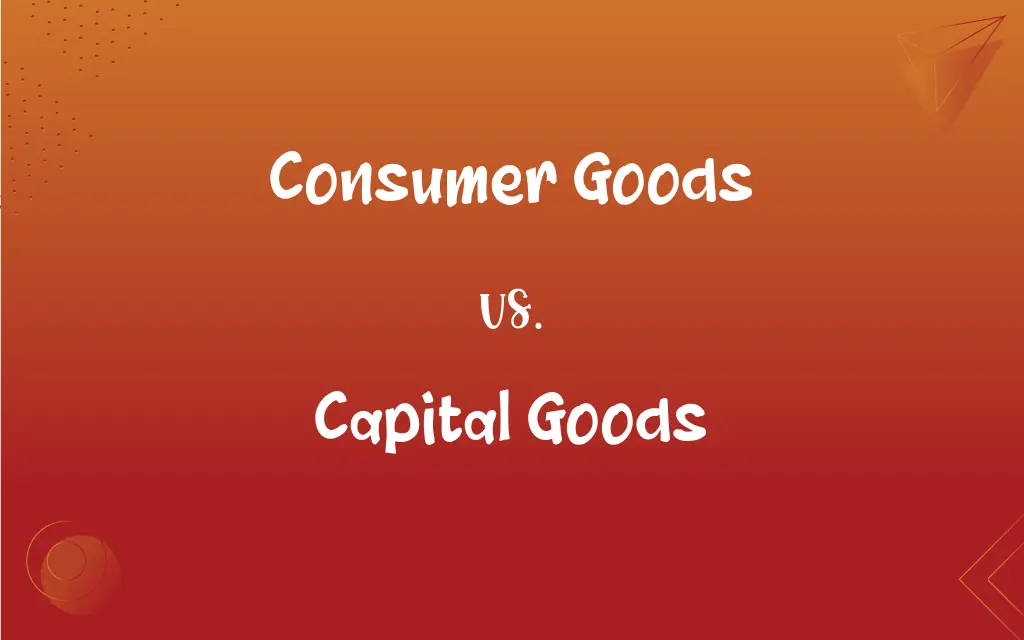Consumer Goods vs. Capital Goods: What's the Difference?
Edited by Aimie Carlson || By Harlon Moss || Updated on October 24, 2023
Consumer goods are products bought for direct consumption; capital goods are products used to produce other goods and services.

Key Differences
Consumer goods and capital goods play vital roles in economic structures, but they serve different purposes. Consumer goods refer to final products purchased by individuals for immediate use or consumption. Examples include food, clothing, and electronics. In contrast, capital goods are products used in the production process of other goods and services. They aren't intended for direct consumption but aid in creating consumer goods. Examples include machinery, tools, and equipment.
Within the economic landscape, consumer goods act as the endpoint in the production chain. Their demand often drives market trends and influences production strategies. Capital goods, on the other hand, are foundational to the production process. Industries invest in capital goods to increase or maintain their production capacities.
Another distinction between consumer goods and capital goods lies in their longevity and use. Consumer goods are often used up quickly or have a shorter lifespan, leading to frequent repurchases. Capital goods, conversely, have a longer lifespan and serve businesses for extended periods, often necessitating significant investments.
In terms of economic indicators, consumer goods sales can reflect immediate economic health, consumer confidence, and spending patterns. Rapidly changing sales numbers might indicate volatile economic conditions. Capital goods' production and sales, however, can signal future economic trends. High investments in capital goods might suggest industry confidence and anticipated growth.
From a business perspective, companies that produce consumer goods cater directly to end consumers and focus on creating products that meet immediate demands. On the other hand, businesses that manufacture capital goods target other businesses, ensuring their products enhance or streamline the production process for their clientele.
ADVERTISEMENT
Comparison Chart
Intended User
End consumers.
Businesses.
Purpose
Direct consumption or use.
Production of other goods/services.
Lifespan
Often short-lived or used up quickly.
Longer lifespan, used over extended periods.
Economic Indicators
Reflect immediate economic health.
Signal future economic trends.
Examples
Food, clothing, electronics.
Machinery, equipment, tools.
ADVERTISEMENT
Consumer Goods and Capital Goods Definitions
Consumer Goods
Finished products ready for the market.
Packaged snacks are consumer goods available in supermarkets.
Capital Goods
Products aiding in the production process.
Computer servers used by tech companies are capital goods.
Consumer Goods
Goods that satisfy personal needs and wants.
Cosmetics are consumer goods that enhance personal appearance.
Capital Goods
Investments in goods that generate future returns.
Factories invest in capital goods like robotic arms for automation.
Consumer Goods
Goods that aren't used for further production.
Toys are consumer goods meant for entertainment, not production.
Capital Goods
Goods used to produce other products.
Industrial machinery is a capital good used in manufacturing.
Consumer Goods
Tangible items used up by individuals.
Toilet paper and soap are everyday consumer goods.
Capital Goods
Goods that aren't for direct consumption.
A construction crane is a capital good, not a consumer product.
Consumer Goods
Products purchased for direct personal use.
Shoes and shirts are typical consumer goods.
Capital Goods
Long-term assets that businesses utilize.
A company's fleet of trucks are capital goods.
FAQs
Would a car used for deliveries be a capital good?
Yes, in that context, it aids in the service of deliveries.
Do consumer goods have a longer lifespan than capital goods?
Typically, consumer goods have a shorter lifespan than capital goods.
What's the primary purpose of consumer goods?
Consumer goods are meant for direct consumption or use.
Is the sale of consumer goods a direct indicator of economic health?
Yes, it can reflect immediate economic conditions and consumer confidence.
Is a restaurant's oven a capital good?
Yes, it aids in the production of food for customers.
Do consumer goods sales influence market trends?
Yes, demand for consumer goods often drives market trends.
Are capital goods limited to physical machinery?
No, software and other intangible assets used for business can also be capital goods.
Are capital goods essential for industrial growth?
Yes, capital goods are foundational for producing other goods and services.
Do consumer goods directly contribute to production?
No, consumer goods are endpoints in production, not tools for manufacturing.
Can a piece of art be a consumer good?
Yes, if purchased for personal enjoyment, it's a consumer good.
Can a computer be both a consumer and capital good?
Yes, if used personally it's a consumer good; for business, it's a capital good.
Do consumer goods include services?
No, consumer goods are tangible products, while services are intangible.
Are factories and plants considered capital goods?
Yes, they are assets utilized for production.
Can the same item be both a consumer good and a capital good?
Yes, the classification depends on its intended use, not the item itself.
Are capital goods used directly by end consumers?
No, capital goods are used by businesses for production.
Can a car be considered a consumer good?
Yes, when bought for personal use, a car is a consumer good.
How do capital goods impact a country's economy?
Investments in capital goods can indicate growth and future economic potential.
Which typically requires more maintenance, consumer goods or capital goods?
Capital goods often need more maintenance due to their extensive use in production.
Are investments in capital goods usually more substantial than consumer goods?
Yes, capital goods often require significant investments due to their long-term use.
Why might industries invest in new capital goods?
To increase production capacity or upgrade to more efficient technology.
About Author
Written by
Harlon MossHarlon is a seasoned quality moderator and accomplished content writer for Difference Wiki. An alumnus of the prestigious University of California, he earned his degree in Computer Science. Leveraging his academic background, Harlon brings a meticulous and informed perspective to his work, ensuring content accuracy and excellence.
Edited by
Aimie CarlsonAimie Carlson, holding a master's degree in English literature, is a fervent English language enthusiast. She lends her writing talents to Difference Wiki, a prominent website that specializes in comparisons, offering readers insightful analyses that both captivate and inform.































































